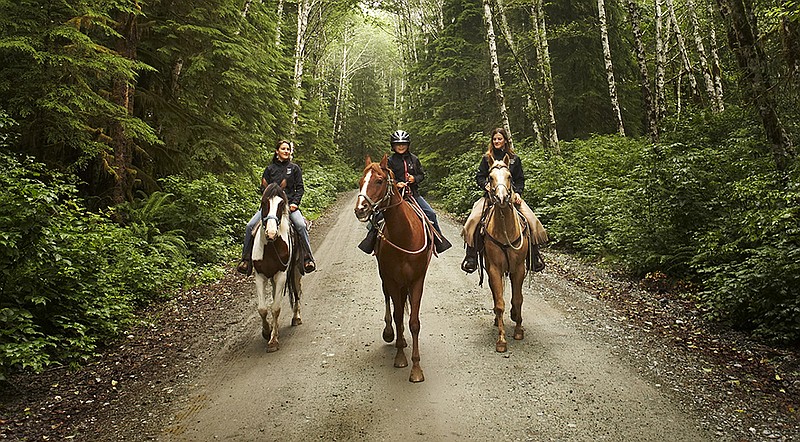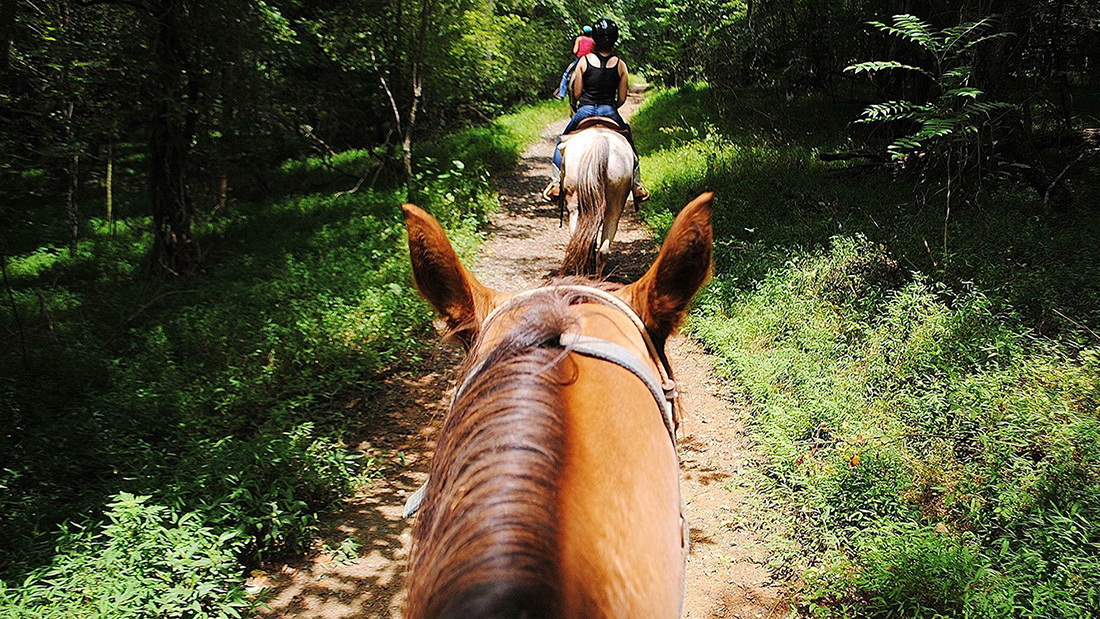Equestrian camping may be a lesser-known way to experience the outdoors due to the specific knowhow required, but when mastered, it can be an incredible bonding experience for both horse and rider.
There are several destinations throughout the Southeast where you can take your horse and camp together in the wilderness. Here are a few campsites within a short car ride away that offer trails and campsites designed for a fun and challenging trip with your horse.
Pigeon Mountain-Saultopaul Stables
Drive time from downtown Chattanooga: 35 minutes
Difficulty: Easy to moderate
Cost: Visit saultopaulstables.webs.com for details on pricing.
With approximately 1,200 acres of trails, this equestrian camping area has everything you need, including the beautiful scenery of Lookout and Pigeon mountains. The trail network includes creeks, bridges, hills and level ground. Campsites offer full camper hookups, tent sites and campfire pits, as well as barns, pastures and hitches for your horse.
Cherokee National Forest
Drive time from downtown Chattanooga: 1 hour, 5 minutes
Difficulty: Moderate
Cost: Up to $15/night
Located in the Southern Appalachian Mountains, this national forest offers six prime horseback riding trails and two equestrian campsites. Lost Corral Horse Camp, off of the 20-mile Starr Mountain Horse Trails, provides a cozy camping area for horse and rider, equipped with hitching posts, picnic tables and firepits. Young Branch Campground, located off of the 15-mile Little Citico Horse Trail, is another perfect resting spot after a nice day of riding. This campsite offers 25 stalls and a horse corral.
Circle E Guest Ranch
Drive time from downtown Chattanooga: 1 hour, 25 minutes
Difficulty: Challenging
Cost: Starting at $20/night
Located just outside of Winchester, Tennessee, Circle E offers 120 miles of marked trails and 240 campsites for horseback riders. The trails encompass breathtaking views of mountains, caves, waterfalls and creeks. Amenities for campers include water and electric, and stalls and bedding for horses.
Great Smoky Mountains National Park
Drive time from downtown Chattanooga: 2 hours, 33 minutes
Difficulty: Moderate to rigorous
Cost: Starting at $23/night
Five equestrian campsites accompany the 550 miles of horse trails in this popular national park. Horses are recommended to be well-conditioned to handle these trails because of the stamina required. The campgrounds include picnic areas, firepits, refuse containers, tent pads and horse hitches. Though mostly primitive campsites, it's the perfect setting to end a hard day's ride through the backcountry of the Smoky Mountains.
What if I don't have my own horse?
Several nearby state parks not only offer trails for those with their own horse, but also the chance to rent a horse for a guided trail ride. These facilities also offer stables, camping and other amenities for those with their own horse.
TENNESSEE
Cedars of Lebanon State Park: $35/person for an hourlong ride (weekends only), though more expensive private rides can be scheduled for other times. Call 629-772-1687.
Chickasaw State Park: $25/person for an hourlong ride on 5 miles of trails. Call 731-609-6562.
Warriors' Path State Park: $18/person for 30-minute trail ride or $26/person for an hour. Call 423-677-0368.
GEORGIA
F.D. Roosevelt State Park: $45-$145 for 1- to 4-hour creek, overlook, wagon train and advanced "cowboy" rides (age 3 and up). Reservations required. Call 706-628-7463. Closed on Mondays.
ALABAMA
DeSoto State Park: $30/person for 1-hour waterfall ride to both Veil Falls and DeSoto Falls, or $50/person for 2-hour waterfall ride. Call 256-634-4027.
Oak Mountain State Park: $45 for 1-hour ride (age 10 and up). Call 205-253-1299.
The Do’s and Don’ts of Horse Camping
Do take along everything your horse uses at home — blankets, feed buckets, brushes, etc. — to keep your horse comfortable in an unfamiliar setting.Don’t pack anything unessential for yourself. With all of the gear you’ll need for your horse, try to keep your own gear to a minimum to lessen the load. Dead weight on a horse’s back is more difficult for the animal.Do feed your horse its usual diet.Don’t “treat” your horse to special feed to prep it for the trip. This may cause digestive issues, which are not something you want to deal with while on the trails.Do keep your horse hydrated with water and electrolytes.Don’t overwhelm your horse’s system with a large dose of electrolytes. According to veterinarians, large doses actually dehydrate horses by pulling fluid out of their bloodstream. A recommended dose is 1-4 ounces, depending on sweat loss and the heat and humidity levels.Do keep your horse alone or with its horse companions when bedding down for the night.Don’t turn out your horse with horses he doesn’t know. He will spend the night getting to know the strangers and establishing a pecking order of the herd instead of getting much-needed rest after a long day of riding.Do get your horse in shape before the trip. Exercises such as walking in sand and hill work will prepare him for the strenuous workout on the trails.Don’t work your horse too much in preparation. Going too hard can pull a muscle or ligament, or cause other stress-related injuries.

